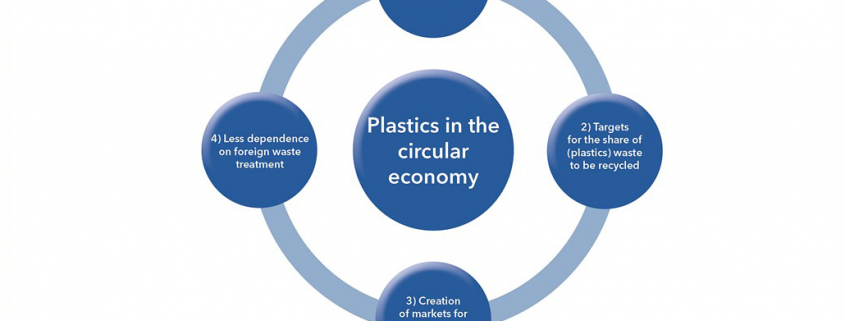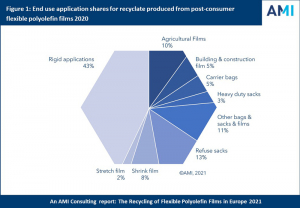Outlook for the Recycling of Flexible Polyolefin Films in Europe
A recently published study from AMI Consulting – a provider of information, market intelligence and events for the global plastics industry – aims to quantify the market for flexible polyolefin recycling in Europe.
According to the consulting firm, the report analyses the industry’s operating environment and the particular challenges involved in the collection, sorting and recycling of flexible films. It is based on “AMI’s comprehensive and detailed in-house data on virgin polymer demand, polymer end-use applications, and recycling capacities” – and was combined with a research program including conversations with industry participants.
“The quantitative analysis includes a focus on volumes of post-use flexible polyolefin films generated as waste by end-use sector and, considering collection rates, levels of contamination and international trade in post-use plastics, an assessment of the volumes of post-use films available to EU+3 recyclers as inputs into the recycling extrusion process,” the company underlined. “The latter data point is of particular importance given it marks the new calculation point for the EU’s recycling targets. Data is provided for the years 2019, 2020 and 2021, with forecasts for 2025 and 2030.” The report would also identify the top six countries regarding recycling capacity for flexible polyolefin films in Europe.
“This is complemented by a detailed analysis of existing and emerging end-use applications for the outputs of the recycling process, providing data for 2020, 2025, and 2030.” Furthermore, the analysis was accompanied by an assessment of the industry’s changing operating environment and the associated implications for the industry’s future development.
“In a market where demand for recyclates has traditionally been determined by fluctuations in virgin polymer prices, market forces alone are not sufficient to create a viable operating environment for recyclers,” AMI stated.
The legislation had become increasingly important as the key instrument to incentivize recyclate use beyond the sectors where consumer pressure and brand owner commitments have initiated change. Measures of key relevance can be found in the EU Strategy for Plastics in the Circular Economy.
“With deadlines for meeting EU recycling targets approaching the recycling industry needs a clear commitment to investments into Europe’s collection and recycling infrastructure for flexible films,” the consulting firm is convinced. “There is significant potential to increase the volume of post-use films made available for recycling, and to produce higher quality recyclates suitable for a broader range of end-use applications.”
www.ami.international/cons/prod.aspx?catalog=Consulting&product=M286
(Published in GLOBAL RECYCLING Magazine 3/2021, Page 8, Source: AMI)









